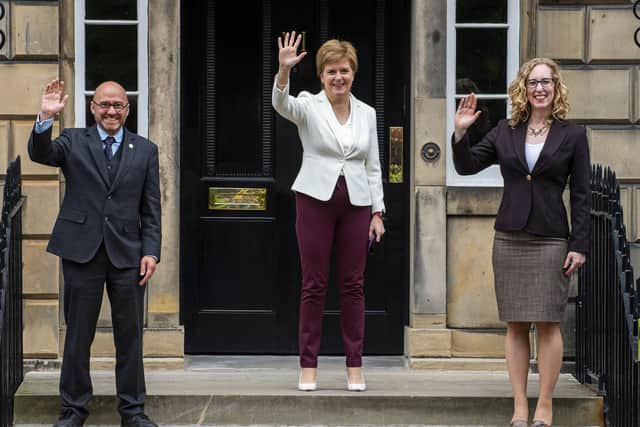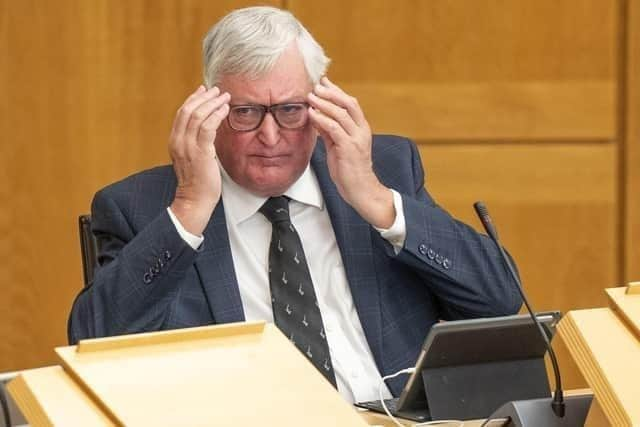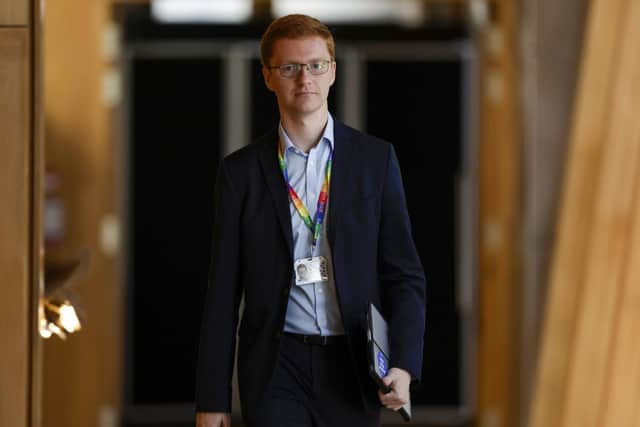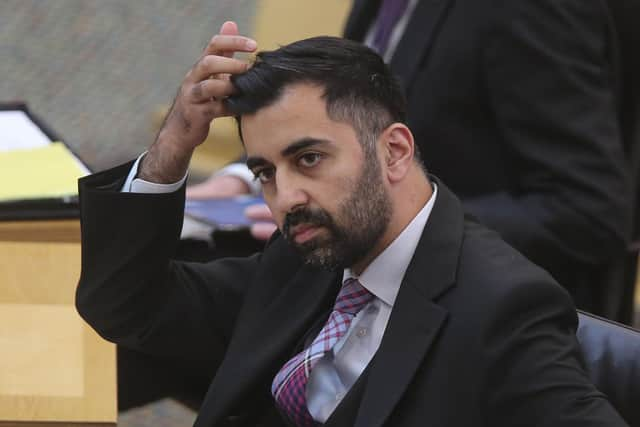Insight: Greens could harm SNP’s election as Bute House Agreement set for second trans rights test


Hostility between Scotland’s two governing parties as a crunch general election looms is being manufactured by SNP backbenchers hostile to “progressive politics”, key figures in the Scottish Greens have insisted, as SNP MSPs get poised to potentially spark a second rebellion over transgender policy.
Much of the apparent disdain held by a number of SNP MSPs with the Bute House Agreement drawn up by Nicola Sturgeon in the summer of 2021 to give her a pro-independence majority, has former cabinet secretary and now vocal critic of his party’s leadership, Fergus Ewing, at the centre of it. But using Greens as a scapegoat for the SNP’s internal troubles has been dismissed by key players in the junior coalition partner.
Advertisement
Hide AdAdvertisement
Hide AdAs MSPs return from Easter recess, a tussle around transgender rights, which the Greens are proud defenders of, could set blood boiling again on the SNP backbenches amid fears the First Minister may attempt to “appease the Greens” over a stark report into gender services for young people south of the Border.


The Scottish Greens, co-led by Scottish Government ministers Lorna Slater and Patrick Harvie, have never been more popular with the public. But if you believe the polls, the SNP is braced for its most difficult Westminster election in more than a decade and their partners in government could contribute to their downfall.
At the last Westminster election, no Scottish Green candidate secured more than five per cent of the vote, but some in the SNP worry in marginal seats those potential SNP votes going to the Greens instead could cost pro-independence seats in the Commons.
Public opinion and political analyst, Mark Diffley, said that “the Greens have not really suffered at all” from the arrangement with the SNP.
He added: “They got nine per cent in the 2021 election. Every poll since then has had them between eight and 14 per cent. That suggests that they would do at least as well as in 2021. It’s bucking the trend of junior coalition partners. The Green vote looks pretty solid.”


Greens MSP Ross Greer told Scotland on Sunday that “we were told in the summer of 2021 that smaller parties always get damaged in a coalition, but it’s really not been the case”.
The Greens are polling above where they were at the last election - between nine per cent and 14 per cent for Holyrood regional voting intentions.
Mr Diffley warned that “the SNP has lost about 10 percentage points in the last 18 months or so”.


Advertisement
Hide AdAdvertisement
Hide AdHe added: “When we plot the polls against key dates, it looks like Nicola Sturgeon resigning and the investigation into the SNP’s finances have been triggers for that.
“The Greens are not going to win any seats. But I think there are many, many marginal seats, particularly across the central belt. If the Greens do equally as well or even put on a few votes from 2019, it stands to reason that Labour could be key beneficiaries as the pro-independence vote could be split.”
But Mr Greer dismissed any suggestion the Greens owed the SNP by not standing in marginal seats.
He said: “The Bute House Agreement is an agreement relating to the Scottish Government, it’s not an electoral agreement. In any other European country, it would be mad to see coalition parties suggesting electoral tie-ups with rival parties.


“That attitude treats voters with a huge amount of disrespect.”
The Greens MSP insisted the coalition partners squabbling over votes is “not because we have fallen out”.
He added: “It’s because that is how political parties function in a democracy. Me and Humza are still friends. We are not going to fall out because of the general election. It is completely normal in a democracy.”
Asked if the Greens are able to yield more influence in government than as an opposition party that often held the balance of power around the annual budget, Mr Greer stressed it was “night and day”.
Advertisement
Hide AdAdvertisement
Hide AdHe added that the Greens are “right there from the very start” of the Scottish Government’s budget process.
According to documents obtained by Scotland on Sunday through freedom of information responses, in addition to “fortnightly liaison meetings” between SNP ministers and the Greens, Mr Greer met 10 times with Deputy First Minister Shona Robison in the run-up to her delivering her draft Budget on December 19 including four discussions in the week leading up to her announcement.
Other documents seen by Scotland on Sunday show that as of March, Mr Harvie has attended nine cabinet meetings of the Scottish Government and Ms Slater has taken part in 11 meetings since the Greens teamed up with the SNP. The Bute House Agreement states “at least twice a year” the Green co-leaders will be invited to attend cabinet meetings.
But Mr Ewing wants Mr Yousaf to cut ties with the Greens - claiming they have too much influence and are damaging trust in his party.
The Inverness and Nairn MSP has specifically pointed to the troubled deposit return scheme, which he claimed was “probably the worst executed scheme since devolution”, overseen since 2021 by Ms Slater - as well as now-dropped controversial plans for highly protected marine areas and the now-abandoned gender recognition reforms.
Mr Ewing told Scotland on Sunday that the Greens are responsible for “dreadful policies that have completely failed”, warning that the SNP is being “tarnished by association” with the “self-confessed extremists”.
Mr Ewing added that placing the Green co-leaders as ministers in key roles was “recklessness” by Ms Sturgeon as part of the Bute House Agreement and has called on Mr Yousaf to end “political insanity and electoral suicide” by moving the Green duo from their briefs.
He claimed that Mr Yousaf “could have saved himself a hell of a lot of political damage” if he had switched up the Green ministerial roles when he became First Minister.
Advertisement
Hide AdAdvertisement
Hide AdHe added: “The SNP has spent 20 years building trust with the people of Scotland and has spent the last three years destroying that trust.
“The biggest mistake the SNP made in its history was voting in Humza Yousaf and not Kate Forbes.”
On his personal relationship with the Green co-leaders, Mr Ewing joked that “I can’t say that Patrick Harvie and I are going to be besties” and admitted “I just don’t know Lorna Slater”.
He added: “I feel sorry for Lorna Slater in a way. She was put in a position of trying to implement a policy already badly implemented by civil servants.”
Mr Ewing claimed that the Greens are “fixated about gender reform and obsessed with banning things and making things free”.
But the SNP hostility is not exclusive to Mr Ewing. Other outspoken SNP backbenchers have pointed to the Greens being staunch supporters of self-identification for transgender people as reason why the Scottish Government pressed ahead with the gender recognition proposals, essentially scrapped by Mr Yousaf after they were blocked by the UK government.
Mr Ewing claimed that “the SNP was ready to compromise on the GRR on changing it from 16 to 18 year-olds, but the Greens threatened to resign”, but an SNP source insisted this was not true.
Another SNP MSP told Scotland on Sunday that “concerns about the relationship will have increased” and Mr Yousaf may have another headache to deal with when Holyrood restarts after Easter recess this week.
Advertisement
Hide AdAdvertisement
Hide AdOpponents of transgender rights have urged the Scottish Government to suspend the use of puberty blockers and hormones after the Cass Review into children’s gender care in England found “unclear” evidence into the treatment.
The SNP source added that “the response to the Cass report may be pivotal”, with backbenchers looking “to what extent will the SNP attempt to appease the Greens rather than act in the best interests of Scottish children”.
The SNP’s 2021 Holyrood manifesto vaguely committed to “identify the best and most effective way to improve and simplify the process by which a trans person can obtain legal recognition” while the Greens committed to “deliver long overdue reforms to the Gender Recognition Act, including statutory self-declaration”.
The MSP added that “the cost of the arrangement, whilst making for an easier life for the executive, could prove to be ultimately too high”.
Mr Greer has suggested the Greens have become a convenient scapegoat for some in the SNP for the party’s woes.
He said: “When you are in a difficult position, it’s very easy to blame everyone but yourself for that.
“If it was our fault, their public support would have dropped two and a half years ago but it didn’t. It dropped last March and we all know what happened to the SNP last spring. That’s an internal challenge for them.”
Mr Greer added: “Those in the SNP who oppose the Greens also seem to be opponents to the First Minister and opponents of progressive politics. They don’t want to be implementing things that are in their manifesto.”
Advertisement
Hide AdAdvertisement
Hide AdA Green source told Scotland on Sunday there was “no doubting the personal animosity” towards their party by Fergus Ewing, as well as claiming the former SNP minister held a “hostility to progressive politics, whether that’s in the shape of equalities or environmentalism”.
The insider claimed that the voices of those SNP backbenchers unimpressed with the coalition “are amplified beyond their numbers”.
It is unlikely that the Bute House Agreement is going to be ripped up while Mr Yousaf remains First Minister.
The majority of SNP MSPs and party members support the arrangement, as do the Greens. But that could potentially shift if Mr Yousaf loses authority if the general election is as disastrous for the SNP as many are predicting.
One SNP minister told Scotland on Sunday that “the vast majority support the Bute House Agreement”.
They added: “We need to take responsibility for the problems we have faced as a party over the last year. It is a waste of time and energy to point the finger at the Greens, and the voters aren’t going to fall for it.”
A “Bute House Agreement working lunch” was held at St Andrew’s House in November, attended by the First Minister, Deputy First Minister and some cabinet secretaries. The senior SNP and Greens MSPs discussed “progress on the Bute House Agreement and where we are going” along with “future policy developments”, suggesting there are no plans to wind up the co-operation deal.
Comments
Want to join the conversation? Please or to comment on this article.